Spartacus, 1960, directed by Stanley Kubrick, screenplay by Dalton Trumbo, from the novel by Howard Fast
When most actors discover they didn't get a role they wanted, they react like you or I would: by driving to Las Vegas and spending the rent money on blackjack and cocaine. But Kirk Douglas was never most actors. So when William Wyler gave the role of Ben Hur to Charlton Heston, Douglas decided he'd make his own sand and sandals epic, better than Ben Hur, staring himself and not Charlton Heston, and who wants to work with William Wyler anyway? For his subject, Douglas chose Howard Fast's fictionalized version of the Third Servile War, Spartacus. Perhaps Douglas recognized a kindred spirit in Fast, who, on finding himself blacklisted from publishing because of his refusal to testify before the House Committee on Un-American Activities, published Spartacus himself. Like most projects started to compensate for rejection, Spartacus is self-consciously designed to proclaim its own greatness in every possible way. But it was made during the golden age of Hollywood epics, when the bar for films proclaiming their own greatness was very high indeed; Cleopatra wouldn't spoil everyone's fun for another three years. So how did Douglas signify to audiences that they were watching an epic?
Start with the film stock. Part of the point of epic filmmaking is to make something that television can't possibly compete with, which means an very wide aspect ratio, projected on gigantic screens. Masked 35mm is the cheapest and easiest way to get the aspect ratio, but you're not even using the entire 35mm frame, so it gets grainy if you project it on too big a screen. Anamorphic 35mm uses the full frame and looks better—that's what widescreen filmmakers normally use today—but it's still not as sharp as you want if you're going to project it onto screens the size of small towns. So you've gotta go higher resolution, which usually means 65mm stock. Ben Hur—the production Douglas saw as his direct competition—was shot using a process called MGM Camera 65, which not only used a 65mm negative but an anamorphic lens on top of that, and produced what is probably the widest aspect ratio in commercial features: a 2.76:1 image. But 65mm film stock is ridiculously expensive, so Spartacus was shot using a different process called Super Technirama 70. Despite the name, Super Technirama doesn't require 65mm film stock. Instead, standard 35mm was run through the camera sideways, allowing for a wider aspect ratio that could still produce a good-looking 70mm print.1 Which is to say, a print where shots like this look like an army, not a failed experiment in Pointillism.
That kind of shot is what large-format film is designed for—you can see every dollar on-screen. And Spartacus lets you know with every frame that giant screens are the only way to see it; this was not shot with television in mind. Take the scene where Tony Curtis's Antoninus performs a magic trick for a group of rebel slaves. Kubrick opens with this shot:
A contemporary filmmaker shooting the same scene might use that framing as an establishing shot, but Kubrick stays on it for more than thirty seconds, following Curtis as he performs an entire magic trick. He only cuts closer when Curtis approaches Jean Simmons and Kirk Douglas, and even then the camera keeps its distance. It's true that long takes are still around, but look how little of the frame Curtis takes up, and keep in mind that the point of the shot is what Curtis is doing with his hands. There are ways to signify "epic" without using giant crowds.
I found it interesting to compare Kubrick's compositions with contemporary use of wide aspect ratios, more for what's missing than what's there. You won't find a shot in Spartacus that resembles this:
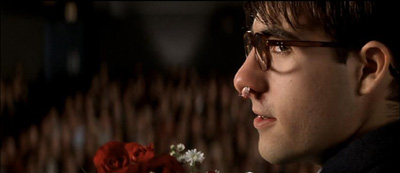
Or this, from a very different filmmaker the same year:
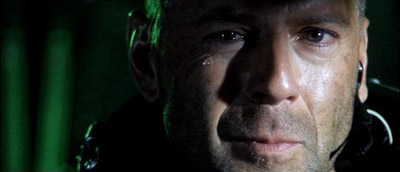
With a very few exceptions, Kubrick's close-ups show the actor's full head, as in this shot:
And, although there are plenty of wide-angle shots, you won't find anything like this:
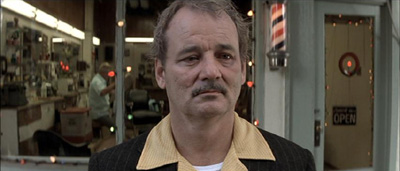
Or this:
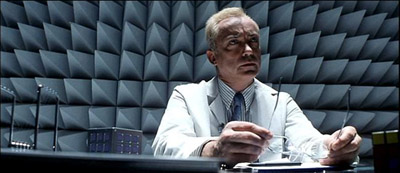
There are wide-angle medium shots, like this one:
But notice that John Dall is far enough back from the camera that his face isn't particularly distorted; compare that to Bill Murray's cartoonish face in the still from Rushmore (or pretty much any close-up in A Clockwork Orange). It's a different cinematic grammar, closer to classical Hollywood cinema than anything else of Kubrick's I've seen.
The camera movement is also atypical for Kubrick̬his previous film was Paths of Glory, in which the most striking visual images depend on tracking backward through the trenches—and of course, this is the man who would go on to photograph the corridors of the Overlook Hotel. But in Spartacus, the camera is pretty stationary throughout; most of the motion is panning, and limited examples of horizontal tracking. There most prominent exceptions bring us back to the "self-consciously epic" thing. There's a long shot of horsemen in a distant valley:
Which tracks back to reveal a watchman on the cliff above:
And then tracks further back to pick up Kirk Douglas on horseback:
From there the camera tracks horizontally as Spartacus rides through the camp. So Kubrick uses a track backwards to play with scale in a way that makes viewers painfully aware of what a gigantic production they're seeing. Then there's this sequence, after the climactic battle between the rebel slaves and the Romans:
The camera tracks forward over the bodies of the defeated slaves, slowly panning up to reveal that the carnage goes as far as the eye can see. As with the other sequence, the tracking is used to for an effect of scale: you wouldn't believe how many corpses the Romans produced! And if this shot reminds audiences of another epic, then so much the better. So there are some examples of three-dimensional movement in the film, but I thought it was striking how stationary the camera remained, and how self-consciously horizontal many of the compositions are. It doesn't get any more wide-screen than this:
In short, it doesn't look anything like a Stanley Kubrick film. But this was an atypical production for Kubrick, the only one he didn't have near-complete control. He was brought in a week into shooting when Douglas fired Anthony Mann, handed a copy of the script and given a weekend to take over the production (his offer to rewrite the script was summarily rejected). Spartacus was a smart career move for him, since he hadn't made a film in two years and had never run a production of this size, but it's clear his heart wasn't really in it.2
Which makes it sound like Spartacus was doomed to mediocrity by its troubled production history, but it does has its pleasures. Mostly, they come from the last ingredient for an epic: epic casting. There's no question that Douglas is the star (and plenty of shots of him looking noble):
But you can't make a really big movie with only one star; convention demands that such a film be cast within an inch of its life. So for every scene where Kirk Douglas speechifies about freedom and slavery, there's a matching scene where Lawrence Olivier, as Crassus, is sinister and sly.
Better yet are Peter Ustinov and Charles Laughton, who often seem to be checking in from a different film, a light comedy about lust and gluttony.
As it happens, that isn't far from the truth: Ustinov apparently rewrote most of their scenes, much to Dalton Trumbo's dismay. So although it may not serve the rest of the film well, the scenes with Ustinov are better than the ones with Douglas. Ustinov won an Oscar for his performance; Douglas wasn't even nominated.
That isn't entirely fair to Douglas: it's always more interesting to watch vice than virtue. But the difference between the Roman scenes and the scenes with Spartacus is so great that I think it points to the film's biggest problem: Spartacus doesn't have any flaws. After the film's opening scenes, in which Spartacus is basically feral, he stops making mistakes. There aren't any arguments among the slaves about what to do, there aren't any power struggles between Spartacus and his lieutenants, there aren't any tactical errors. There are flickers of life when Herbert Lom appears as an untrustworthy pirate:
But for the most part the scenes with the slave army are a cinematic essay about how great freedom is in general, and how great Spartacus is in particular. Any actor would have a hard time making that kind of pablum interesting, but Kirk Douglas is particularly ill suited for it. I've always thought he was better cast as a villain than as a hero; he has a hail-fellow-well-met quality that only shines for me when it's backed by malice. But malice is beneath Spartacus, and that's the problem. In his effort to outdo Ben Hur, Douglas ended up playing a character who was too heroic to be interesting. Still, he's undeniably epic.
Randoms:
- The commentary track on the DVD is fascinating, most of all for novelist Howard Fast's contributions, which run the gamut from passive-aggressive to positively venomous. Fast was originally hired to write the screenplay, then fired when it became apparent that his version of the film would contain more speeches than action. You can predict what he'll think of any given scene by checking how closely it follows his novel. Two examples:
This, for example, is not in the book. I don't know that it adds very much. If I remember, the dialogue is rather silly.
I highly recommend listening to the whole thing.
. . . .
This is a brilliantly done scene; it is lifted out of the book almost in its entirety, and well directed, and well done.
- Spartacus gets a lot of credit for the political act of hiring Dalton Trumbo and crediting him under his real name, helping to break the blacklist. And it definitely deserves that praise. But it's also worth noting that the battle scenes were filmed in Franco's Spain, where the production paid the government directly for the uses of the Army. So Spartacus is one of those symbolically-upholding-freedom-while-paying-cash-money-to-dictators productions. Like U.S. foreign policy!
Update: Robert Taylor has thoughts in a similar vein about the film here.
1The difference between 65mm stock and 70mm prints is the 5mm section used for the film's soundtrack.
2As Kubrick put it years later, "I don't know what to say to people who tell me 'Boy, I really loved Spartacus.'"
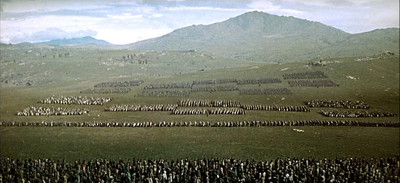
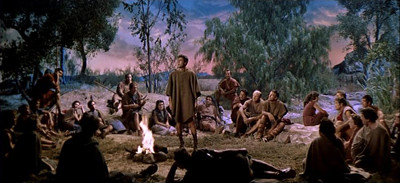
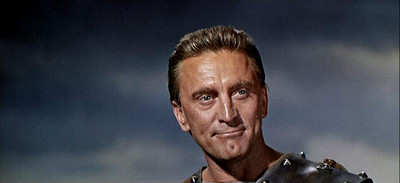
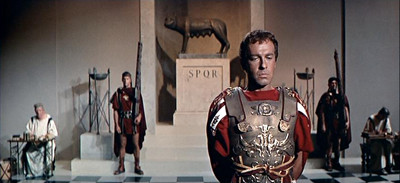
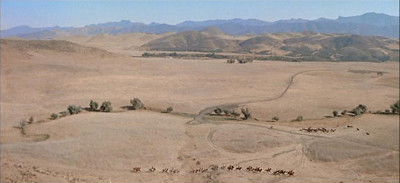

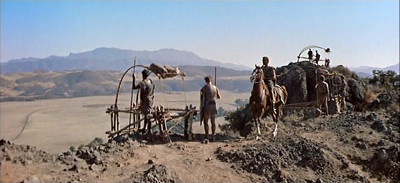
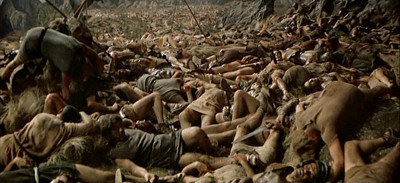
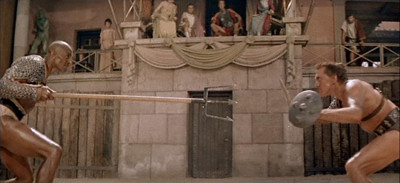
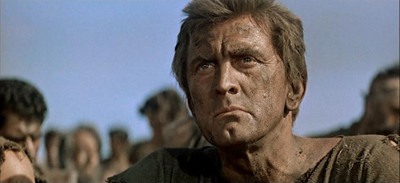
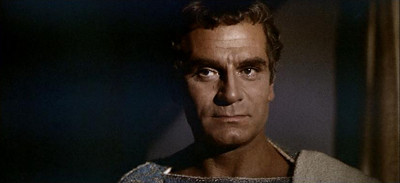
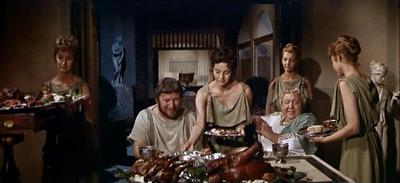
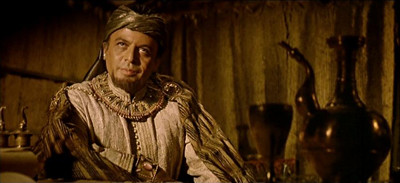


29 comments:
as someone who looks to stanley kubrick as a cinematic father figure, i have ambivalence more than anything else toward spartacus and leans toward indifference.
part of that "perfection" element is in its echoes of marxism. granted spartacus' aim here was not creating a "dictatorship of the proletariat" in rome but for everyone to go home and live independent lives (as naive as that ambition is). but spartacus is the embodiment of good and crassus is the embodiment of evil and solely because the latter owns property and the former doesn't.
the closest thing we get to a tactical mishap was the backpedaling on the pirates and thus the only flaw is spartacus is too trusting and naive. but again, it only proves how really uninteresting he is as a character ... or at least a relatable one. i wonder sometimes also if this is the closest sand and sandals ever got to social realism ... eisenstein in widescreen baby! =]
i do often imagine how kubrick would have handled spartacus. i know there was an interview answer somewhere around about his own thoughts on the matter. as for my own conjecture, kubrick always seemed to be interested in human beings as they really are, not as we like ourselves to be. so a spartacus redux probably would have been in line with that. actually it would have almost been something like what ustinov did with his scenes except done everywhere else too. but i think kubrick gave a better answer and if i have time, i'll find it.
Two updates a month? Couldn't be any happier.
This one definitely isn't anywhere near the quality of Kubrick's great ten, but I think it serves several really important parts of his career. To give a modern analogy I think it's his Insomnia. It's the film they give the hot shot auteur to see if he can make a financial success before letting him blow their money on passion projects. Actually the comparisons between Nolan and Kubrick are probably stringer than that especially considering the role that Nolan takes in Warners.
Once again, great review.
I've always found the "great epics" to be some of the hardest films to sit through. Despite this, I've been trying to track down an affordable copy of this Criterion title for some time (average price is still around $60!!!). I guess I'll have to make do with my recently purchased Criterion Laserdisc of "The Killing". You've obviously seen "Paths of Glory" (and will get another chance in about 400 review's time) so I was wondering if you've seen Kubrick's early crime pictures?
Cheers
DJ Project,
I read the interview you're talking about (it's where the quote about not knowing what to say to Spartacus fans comes from). I don't have it handy, but basically: the Silesian Pirate double-cross was historically wrong. In the real event, Spartacus could have left Italy but instead chose to head back toward Rome, looting and pillaging, and he and Crixus apparently had a falling out and split their forces. Kubrick said something to the effect of that being a much more interesting story than the one in the screenplay.
Legato,
Yeah, Kubrick definitely made the right career decision taking this production; no one could question his ability to manage star personalities and complicated logistics once he got this to the screen.
Brendan,
I regret to say that I haven't yet seen The Killing. But as I've been on a Jim Thompson kick lately, it's probably time. To the bat-queue!
The part of this movie that really stood out for me when I first saw it (and still stands out for me today) is the scene where Kirk Douglas drowns the slave overseer/trainer in a pot of... God! What is that slop? I have never seen a more disgusting semi-liquid substance in any other movie including The Exorcist. Look at the way it clings to Douglas' arms and shines with congealed nastiness: It is Epic Swill! Maybe Kubrick designed it. Anyway, derail done; go on back to serious discussion.
I remember the more 'left' parents of my friends valued the picture because of it association with Fast.
It was taken (by them, anyway) as 'anti-McCarthyite'.
Everyone should take such care with analysis as you do!
That was yet another fantastic review. Incredibly insightful and thoughtful.
I love epic films, and Spartacus is one of my favorites (though I have to say, not as high on the list as Ben-Hur) in spite of its flaws. Its positives are tremendous, and even its lesser qualities are still interesting.
And I think there's a reason the "I'm Spartacus" scene is so iconic: it's a stunningly powerful sequence, as is the crucifixion finale following it.
It's never surprised me that Kubrick was never enthusiastic about this film, but even without his heart in the project, he's one of the finest directors ever to live, and I personally would put this no lower than the middle of an extraordinary filmography.
At any rate, while I did like the film a lot more than you (and the rest of the commenters, it seems), I really appreciate the review. Even though I disagree, it's probably my favorite review of the film.
Love your review and agree with pretty much everything you said.
I've always felt like Spartacus has this little streak of subversion in it. It's straightforward in its content, but there's just a hint of someone's tongue being lodged in the cheek, as if Kubrick was playing in the studio's boundaries, but still poking around to see how far he could stray, especially in the film's sexual content. (Love the scene where Spartacus sort of raises his sword from his midsection when his slave owner slaps him. There's a textual mingling of sex and violence sprinkled throughout.) Maybe I'm just over-analyzing to try and make sense of Kubrick's huge leap from this movie to Lolita, but I still feel that there's something to look for here. I love me some Kubrick, I don't really love Spartacus, but I find myself watching it a hell of a lot more than Ben-Hur.
Great review!
Some scholars have said that Kubrick did Spartacus to prove he could do a studio epic (i.e., mark it off his checklist) and then move on to projects he wanted to do.
I've also read some literature that connects Kubrick's love of chess/fascination with different chess moves and strategy with his meticulous configurations of soldiers in the battle scenes' long shots.
As far as pushing the sexual boundaries, there's also the relationship between Tony Curtis' and Laurence Olivier's characters and the bathhouse scene that was later cut. It's been awhile since I've seen Spartacus, but from what I remember, there's a bit of subtext there.
Hi Matthew Dessem,
Greatly enjoy and appreciate your blog. Especially your in-depth analysis and amount of critical thinking that clearly you spent on each movie.
Those movie stills you make are also glorious to look at. How do you make them? In the interview with Christopher Zane you stated that you use Intervideo WinDVD 6 and Adobe Photoshop. Do you still use that procedure?
I ask you this because I also want to start a blog that reviews movies in a poetry form. For the blog I want to make movie stills that can accompany my movie poems. Do you perhaps have suggestions for good freeware programs that also could make stills (I'm a poor student).
Thank you in advance for answering my questions and greetings,
Rick
CCBC,
If it's not Dinty Moore Beef Stew it's something pretty close to it. If I remember correctly someone on the commentary track talks about that stew (& the way Marcellus tries to claw Kirk's hands away from it) as being particularly gratuitous. Maybe they had trouble with the studio about it? Also, it's not Charles McGraw in that shot -- he couldn't keep his head under long enough to get the shot right; eventually they used a stand-in. Anyway, yeah, it's really gross.
Trulyfool,
There are definitely some anti-McCarthyite touches, and obviously hiring Dalton Trumbo to adapt a Howard Fast novel is a political statement in itself. Glad you liked the review!
JJ,
I'm curious what you'd rank below "Spartacus." I saw "The Killing" for the first time this week and thought it was much better.
Averyslave & Kim,
The great thing about the bath scene is that the audio was lost, so Tony Curtis rerecorded his dialogue & Anthony Hopkins did his best Olivier. Which, honestly, pretty much just sounds like Anthony Hopkins.
There is a strain of subversion throughout the film--I think Ustinov says something about it being significant simply because it was secular--that all the other sword & sandals epics give you a horse race between vice and virtue and virtue wins at the very last second; in Spartacus virtue loses, and Christianity isn't around yet, so no one can do the "No, captain! They worship the son" thing at the end. So that's all to the good, but the scenes with Spartacus after the escape from the gladiator school still bore the hell out of me.
Rick,
I still use Intervideo WinDVD 6. I think the Windows Media Player version that comes with Windows 7 can also take stills, but it doesn't have a frame advance. (Later versions of Intervideo haven't worked as well for me; the frame advance and capture tools are the easiest in version 6). You don't need photoshop, though--any image editing program can do cropping & resizing.
What would I put below Spartacus? Eyes Wide Shut, Lolita, The Shining, Full Metal Jacket (though all have some great bits and pieces, and I am very fond of Full Metal Jacket). I'd actually put it about on par with The Killing (which I thought was excellent except for the unnecessary and quickly annoying narration).
But as I said, I really loved Spartacus. Between the sweeping production, superb battle scenes, brilliant performances by Olivier, Ustinov, and Laughton, and the great last half hour, I found it easy to forgive the faults.
And for me, Douglas's presence and charisma carry the less interesting scenes with him in between the Gladiator revolt and the last battle, even if he might not be the best for the role.
Hey, I just wrote about this on my blog too!
http://bobtaylorrocks.blogspot.com/2011/02/spartacus.html
Enjoy the read, bub, as I always do yours.
Robert,
Excellent essay, thanks for the link!
JJ,
Yeah, I like each of those movies more than I like Spartacus, but I think maybe reading Martin Amis's Money put me off Kirk Douglas in hero mode.
I think it's worth paying attention to the ending as a totally brutal thing that it's difficult to imagine anyone outside Kubrick doing in that era (or now, for that matter)- though the movie is certainly relatively steadfast for him, the ending is if anything even more pessimistic than Paths of Glory had been, which is saying something. It would be hard to tack a happy ending onto Spartacus, but I don't remember even the slightest leavening- not the reminder of humanity that Paths has, not the unbearable grave scene in Schindler's List, nothing. All the speechmaking and epic vistas in the movie don't seem like they counteract that.
Also, if you like villainous Kirk Douglas, you're going to love Ace in the Hole.
Tom,
I do love Ace in the Hole! But the end of Spartacus isn't entirely bleak: Varinia & Spartacus's son escape to live as free people. It's not a happy ending, but Paths of Glory feels bleaker to me.
Damn, I knew I was forgetting something- that's the problem with going by what parts I remember from a movie like Spartacus. The humanitarian aspect of Paths of Glory is one of the most memorable parts of the movie, whereas in Spartacus it obviously isn't- I think you can tell which parts Kubrick cared about.
I was lucky enough to see Spartacus on the big screen at a 70mm film festival last year, it's not perfect and they screened Lawrence of Arabia the next day, so it didn't get a chance to shine but Peter Ustinov's bits were brilliant.
"I like both oysters and snails."
I find the ending to be more pessimistic than Paths of Glory. Yes, his son and wife are free but not because the slave revolt was successful, merely because of the genorosity of Gracchus. As the narrator said at the beginning, it would be another 2000 years. Good for Spartacus that his son and wife are free, but what about the others?
It is a movie that sets out to be epic, and it wildly succeeds (Far more so than Ben Hur). People who complain about it nit being human and personal enough might as well complain that Schindler's List isn't very funny.
Also, as a note, I tried reading Fasts novel, a course of action I cant recommend to others.
I'm thinking of looking into this movie, but I'm not sure quite yet - I'm going to watch the whole Kubrick filmography (well, excluding the pre-Killing stuff maybe), but this is one of the least praised by critics in this day and age. I'm grateful this is so early in the Criterion order, as I've been able to look at your thoughts on it.
Post a Comment